Dehydration in elderly adults is a serious condition that arises when people do not get enough fluids, or when they lose fluids too quickly. Water is just as important to human health as oxygen, so it’s vital that we get enough of it at any age. Dehydration in the elderly can cause problems with digestion, body temperature, blood pressure, kidney function, and much more. In this post, we tell you all you need to know about dehydration in older adults.
What is Dehydration?
Dehydration occurs when the body loses more fluids than it gets. It results in an inability to carry out normal bodily functions. Although dehydration can affect anyone, it is especially serious for older adults and young children.
Older adults have lower levels of water in the body, which makes them more susceptible to dehydration. Dehydration in elderly patients is also more common because they tend to have health conditions or take medicines that increase dehydration risk.
Causes of Dehydration in Elderly Adults
There are several reasons why an older adults may become easily dehydrated. The most common dehydration causes include:
Not Drinking Enough Water
Many people simply do not drink enough water throughout the day. This issue may be especially prevalent among those with dementia, who often forget to drink when thirsty. Older adults also tend to have a reduced thirst sense, and so they do not realize they need liquids until they are already dehydrated.
Other times, dehydration can arise from a lack of access to clean water, such as when hiking.
Diarrhea
Having severe diarrhea can cause a huge loss of water and electrolytes. Diarrhea may be acute, meaning it comes on suddenly and lasts for a short period, or chronic, meaning it continues for several weeks at a time. Both types can cause dehydration, although people with acute cases may be more at risk.
Vomiting
Vomiting, especially in conjunction with diarrhea, causes a loss of fluids and nutrients. While vomiting once or twice is unlikely to cause dehydration, continuous vomiting and an inability to keep down food or fluids puts you at serious risk.
Fever
A high fever can cause dehydration. The higher your temperature, the greater the risk. Having a fever in addition to diarrhea and vomiting is especially dangerous.
If you’re feeling unwell, be sure to track your temperature with a thermometer with fever detection.
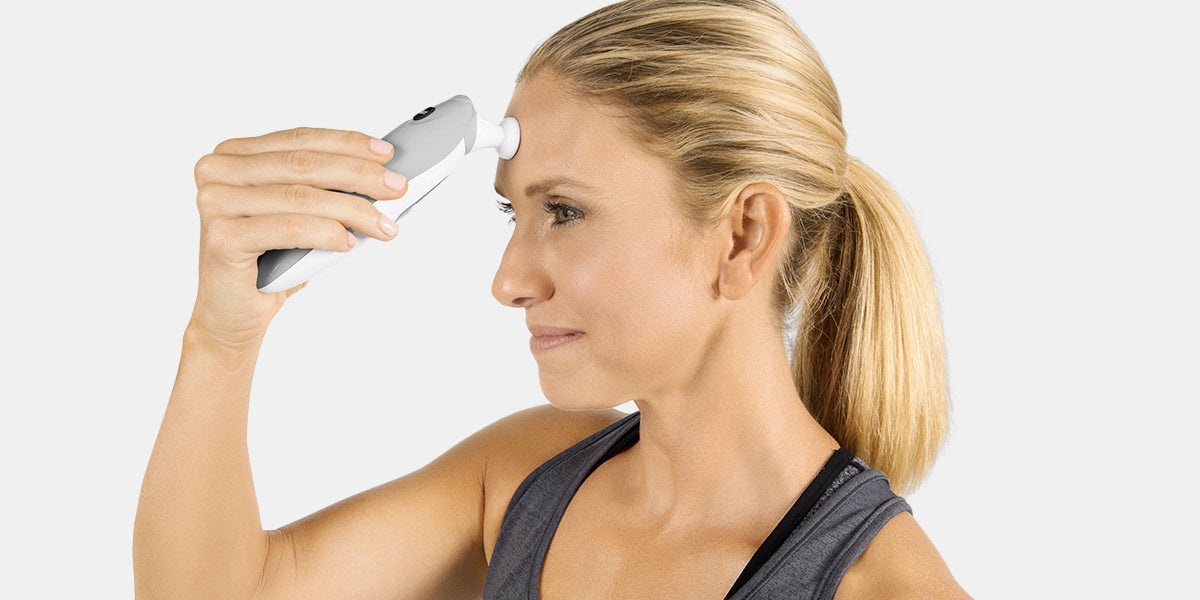 A forehead thermometer will make tracking your fever easier than ever with one-touch readings. ( See Product )
A forehead thermometer will make tracking your fever easier than ever with one-touch readings. ( See Product )
Increased Urination
People who experience an increase in their urinary output should be wary of dehydration. Some conditions, such as uncontrolled diabetes, increase the amount of urine you pass.
While it’s important to address the underlying condition to prevent dehydration, you can also manage increased night-time urination using incontinence pads.
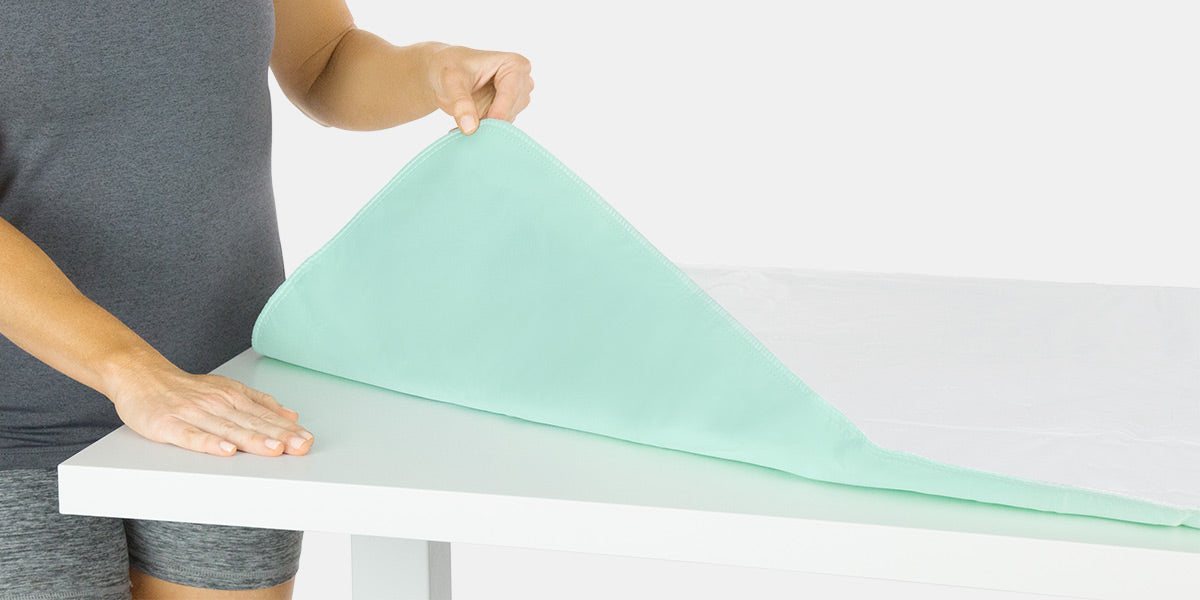 With incontinence pads you can rest easy that your mattress will stay dry and cozy each night. ( See Product )
With incontinence pads you can rest easy that your mattress will stay dry and cozy each night. ( See Product )
Medication Use
Some medicines cause dehydration, typically by increasing urinary output. Examples of such drugs include diuretics, laxatives, medications to treat high blood pressure, and cancer treatments.
Sweating
Getting hot and sweaty causes water loss. People who engage in intense exercise run the risk of dehydration if they don’t stay hydrated before, during, and after activities.
In particular, exercising in hot, humid weather causes excessive sweating and water loss.
Risk Factors
Factors that increase the risk of dehydration in older adults include:
- Having a medical condition such as diabetes, dementia, or kidney disease
- Infection, such as a cold or sore throat, which reduces the desire to eat and drink
- Having fever, diarrhea, or vomiting
- Using medications that increase urinary output
- Lack of mobility, reducing a person’s ability to get water
- Working outside in hot or humid climates
- Exercising vigorously, especially in hot weather
Symptoms of Dehydration in the Elderly
By the time you feel thirsty, you are already dehydrated. For this reason, you should sip water at regular intervals throughout the day, especially when ill or exercising.
Some of the other symptoms and signs of dehydration in elderly adults include:
- Confusion
- Dark-colored urine
- Dizziness
- Dry mouth and tongue
- Fatigue
- Infrequent urination
- Irritability
- Low blood pressure, especially when standing up after lying down
- Rapid heartbeat
- Reduced blood flow to the extremities
- Sunken eyes and cheeks
To avoid dehydration, you should see your doctor if you experience any of the above symptoms or any of the following warning signs and risk factors:
- Bloody or black stools
- Diarrhea for 24 hours or more
- Inability to keep fluids down
Diagnosis
Often, a doctor can diagnose dehydration based on your symptoms and appearance. They may carry out a dehydration assessment in elderly adults, because this age group is so much more prone to dehydration than others.
While there is no single dehydration test, your doctor may perform some of the following to assess your level of dehydration:
- Blood pressure check
- Blood tests to check electrolyte levels and kidney function
- Heartbeat check, using a stethoscope
- Urine tests to show the degree of dehydration and presence of a bladder infection
Recovery from Dehydration in Elderly Adults
When it comes to dehydration in the elderly, treatment involves replenishing fluids and the balance of electrolytes. Some of the best medical treatments and home remedies for dehydration include:
Increased Fluid Intake
The only way to treat and prevent dehydration is to replace lost fluids and electrolytes. In cases of mild to moderate dehydration, this can be as simple as drinking more water and other liquids.
The best drinks for dehydration are:
- Water
- Hot or iced herbal teas (caffeine-free)
- Milk or dairy-free alternatives
- Diluted fruit juices
- Sports rehydration drinks, such as Gatorade
Avoid undiluted fruit juices and soft drinks as these can make diarrhea, and therefore dehydration, much worse.
Rehydration Solutions
Another incredibly effective option is to use a special rehydration solution. These products contain water and salts to restore fluids and electrolyte balance. You can get oral rehydration solutions from your doctor or pharmacist.
In a pinch, you can make your own by mixing a half-teaspoon of salt, a half-teaspoon of baking soda, four tablespoons of sugar, and four cups of water. Drink these solutions in small amounts throughout the day. See your doctor if you remain dehydrated, as oral rehydration solutions should not be used long-term.
Avoid Strenuous Workouts
Do not engage in vigorous workouts when dehydrated. They will make your symptoms much worse and increase your risk of experiencing complications. Likewise, people who get recurrent bouts of dehydration may wish to avoid strenuous exercise, especially in hot weather.
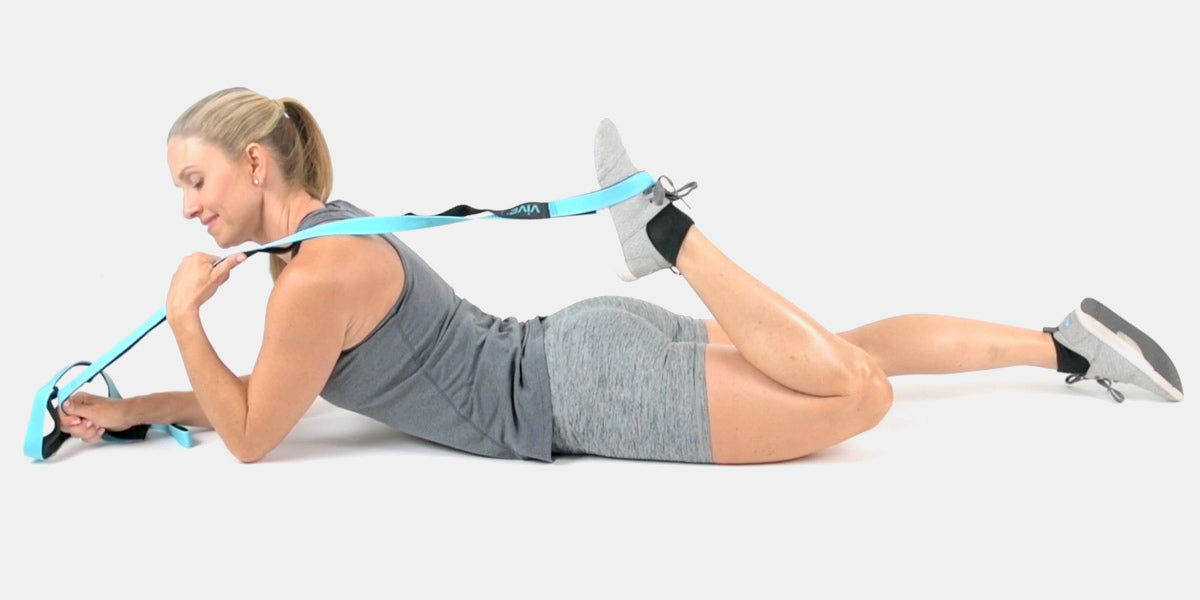 Whether for yoga or other stretches, these straps will help increase your range of motion and stay fit. ( See Product )
Whether for yoga or other stretches, these straps will help increase your range of motion and stay fit. ( See Product )
Once you have recovered, exercise in short bursts and engage in more gentle activities such as yoga and stretching routines with stretch straps. When you do any vigorous activity, start hydrating the day before and continue drinking cool water during and after your workout.
Address Constipation and Diarrhea
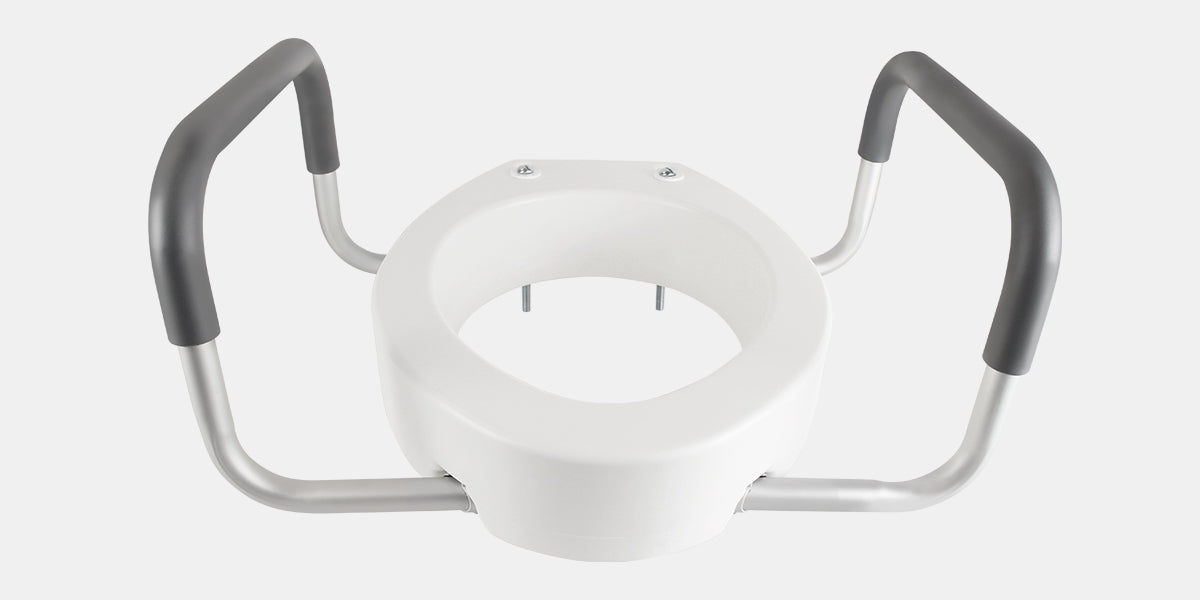 Easy to install and use, a toilet seat riser will make it easy to transfer on and off the commode.( See Product )
Easy to install and use, a toilet seat riser will make it easy to transfer on and off the commode.( See Product )
Constipation is a side effect of dehydration, because the stool becomes too dry and hard to pass easily from the body. Diarrhea is a cause of dehydration. You need to manage either condition in order to feel comfortable and fully recover from your dehydration episode. Staying hydrated is key to both of these issues.
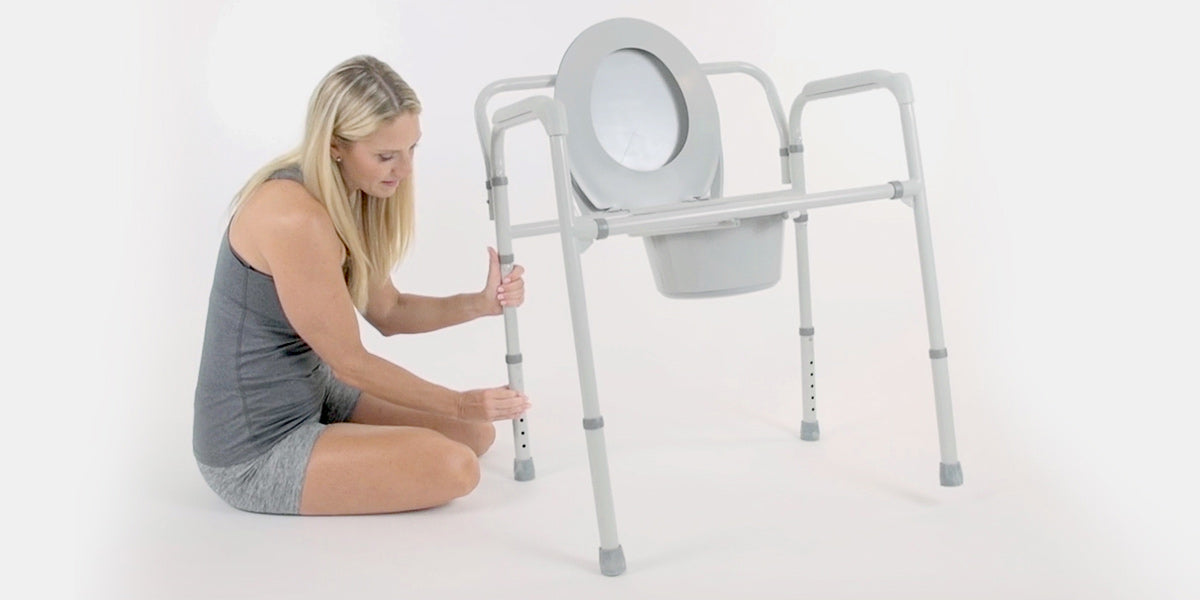 A bedside commode is perfect if you need keep toilet facilities easily accessible.( See Product )
A bedside commode is perfect if you need keep toilet facilities easily accessible.( See Product )
You may also need to see your doctor to address the underlying cause of the diarrhea, or for medications to help ease constipation. Other ways to ease these digestive issues during recovery include using a toilet seat riser and a bedside commode for comfort and convenience.
Monitor your Blood Pressure
High blood pressure is common in those who are chronically dehydrated. It can also be a warning sign of dehydration. Avoid hypotension, dehydration, and their complications by regularly monitoring your blood pressure with a blood pressure cuff.
Discuss Medications with Your Doctor
Some medicines, such as diuretics and laxatives, can cause dehydration. Check your pill organizer to see if any of the medications you are taking put you at risk of becoming dehydrated. Speak to your doctor if you are unsure.
If you are taking diuretics or other drugs that cause recurrent bouts of dehydration, your doctor may recommend switching your medication. Alternatively, they may suggest techniques to reduce urinary output and other medication side effects. Never quit taking any medication without speaking with your doctor first.
IV Fluids for Dehydration in Elderly People
This dehydration treatment is typically reserved for severe cases. If you or a loved one has symptoms of severe dehydration, call 911 or go directly to your hospital emergency room.
Medical staff will fit the person who is dehydrated with an IV line, which administers salts and fluids through a vein. This method of delivery allows quicker absorption by the body and a faster recovery.
Side Effects of Dehydration in Elderly Adults
Severe dehydration in elderly adults can be extremely dangerous. That’s why it is so important to drink water and other fluids throughout the day, even if you don’t feel thirsty.
Some of the most serious complications of dehydration in elderly people include:
Urinary and Kidney Problems
Those who experience ongoing or recurrent dehydration episodes are at risk of urinary tract infections, kidney stones, and kidney failure.
Heat Injury
Intense exercise in hot and humid weather causes excessive sweating. If you fail to drink enough liquids during this time, you may get a form of heat injury, such as heat cramps, heat exhaustion, or heatstroke— a potentially fatal condition.
Seizures and Loss of Consciousness
Dehydration causes a loss of electrolytes, namely potassium and sodium. When these minerals are out of balance in the body’s cells, it leads to disrupted electrical messages. This disruption results in seizures and, potentially, a loss of consciousness.
Hypovolemic Shock
This is the most serious complication of dehydration. Also known as low blood volume shock, hypovolemic shock causes a drop in blood pressure and oxygen levels in the body. It is life threatening.
Preventing Dehydration in the Elderly
Dehydration is usually relatively easy to prevent. Essentially, you need to take in more fluids than you lose. To do this:
- Drink water and other fluids throughout the day
- Limit your intake of caffeine and alcohol, which are diuretics that cause fluid loss
- Eat some fruits and lots of vegetables, which are high in water
- Monitor your thirst levels and drink accordingly
- Check your urine—if you are drinking enough, it should be a pale straw color
Be sure to drink more fluids if you:
- Have vomiting, diarrhea, or fever
- Engage in vigorous exercise
- Live in a very hot or cold climate
- Are in higher altitudes
- Have an illness such as a cold, flu, or urinary tract infection
- Take medications that increase urinary output
Recognizing the Symptoms of Dehydration in Elderly Adults
Knowing the signs of dehydration is key to preventing the condition from progressing into something more serious. If you notice changes in your urinary habits or feel excessive thirst, see your doctor for a check-up.
Although dehydration is easy to treat, it is not without complications. Therefore, you should take steps to prevent dehydration in the first instance. Drink plenty of liquids, keep diabetes under control, and stay hydrated during time of illness and activity.







Leave a comment